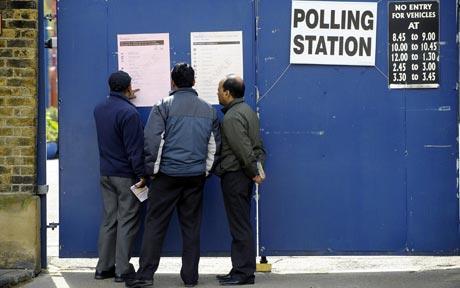Britain likes to think of itself as a successfully multicultural society. With around 15% of the population belonging to ethnic minorities, it was a source of pride that the only notable sectarian divide in Britain was between Catholic and Protestant communities in Northern Ireland. Even this is being addressed. In common with most mature democracies, Britain did not feel the need to vote and act along racial lines.
Not any more.
The London borough of Tower Hamlets has developed a toxic political culture in which race is the key issue in politics, and one man, recently re-elected Mayor Lutfur Rahman has done much to create it. But in order to understand Rahman, you must first know a little about Tower Hamlets.
The borough stretches from the Tower of London (bordering the City itself) in the west to the Isle of Dogs, whose vast shipping docks were the nerve center of the old industrial London. As such, it was the sole preserve of the underprivileged British working class until the 1970s/80s. Then two things happened: the collapse of industrial activity (and corresponding state-backed regeneration) and some of the fastest immigration the country has ever seen. The banking industry and yuppies set up a scattering of outposts in the borough, such as Canary Wharf.
Meanwhile, by the 2011 census, just 31% of the borough’s residents were “White British”. In line with the trend for immigrants of each ethnicity to become concentrated in particular communities, British Bangladeshis now outnumber White British people in the borough. Two key trends were noticed by local politicians: British Bangladeshis are far, far more likely to vote than other ethnic groups. Also, owing to various cultural factors, British Asians in a given area tend to vote en masse for one party. For example, it was George Galloway’s savvy relations with so-called “community leaders” (key figures in local mosques, action groups, etc.) that secured him a surprise victory over Labour in the Bradford West by-election in 2012.
And so the stage was set for a divisive figure like Lutfur Rahman.

Rahman was originally a Labour Party figure, becoming Labour leader of Tower Hamlets council in 2008. He was originally supposed to be the party’s candidate in the 2010 elections for the first directly elected Mayor of Tower Hamlets, but was disqualified after his links with an extremist Islamic entrysist group (which sought to take over the local Labour party) were exposed. He then ran as an Independent and won with a large majority.
For the next four years, Rahman used his massive powers to run Tower Hamlets as his personal fiefdom. He shamelessly used everything from the Council’s newsletter to its bin lorries to promote himself; squandered public funds on his own Mercedes and enlarging his office; and even refused to appear before monitoring committees. But then a nasty, sectarian element crept into his activities. He made council grants almost exclusively to British Asian and Somali mosques, newspapers, TV stations and charities. He accused many who questioned this policy of “racism”, despite expressing intense hurt at the suggestion that it was him who was guilty of discrimination.
By last month’s re-election campaign, Rahman had set up a new political party- “Tower Hamlets First”- which sought to marginalise his former colleagues on the council. Allegations have swirled thick and fast around the campaign- and I stress that they are not proven facts. Allegations include:
- Tower Hamlets First activists gathered in their dozens outside polling stations (which is perfectly legal, but frowned upon) and intimidated voters
- Activists left behind Tower Hamlets First leaflets in polling booths, attempting to influence voters
- Canvassers knocked on doors and on some occasions, when seeing a white person greet them, turned around and left without bothering to talk to them. Which, if true, is reprehensible.
Rahman was re-elected with a majority of just 4%. His party has narrowly failed to win a majority of Council seats.
Rahman drew most of his votes from British Asians, though it’s important to note that some of his harshest critics are Bangladeshi. Evidently some people of other ethnicities have voted for him, although that’s akin to turkeys voting for Christmas given the preferential treatment he’s awarded particular groups. It’s thoroughly disheartening to see politics becoming a matter of race rather than issues: Britain should be light years ahead of that. Ethnic minorities are increasingly well represented in the major parties: there is no need to resort to sectarian politics.
So what do we do about Rahman?
Tower Hamlets has committed itself to his personal control until 2018 (a much-needed reminder of the dangers of creating presidential-style local government). That was their democratic decision, and must be respected. Anyway, the best gift Rahman could get is being victimised by national government. In this case, it is up to his local rivals to present a more positive vision of an undivided Tower Hamlets from 2018 onwards.

